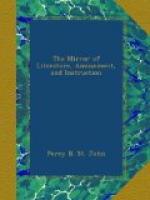Croesus.—The fame of Solon having spread o’er Greece, We sent for him to Sardis. Robed in purple, We and our court received him: costly gems Bedecked us—glittering in golden beds, We told him of our riches. He was moved not. We showed him our vast palace, hall, and chamber, Cellar and attic not omitting— Statues and urns, and tapestry of gold, Carpets and furniture, and Grecian paintings, Diamonds and sapphires, rubies, emeralds, And pearls, that would have dazzled eagles’ sight. Lastly, our treasury!—we showed him Lydia’s wealth! And then exulting, asked him, whom of all men That in the course of his long travels he had seen He thought most happy?—He replied, “One Tellus, an Athenian citizen, Of little fortune, and of less ambition, Who lived in ignorance of penury, And ever saw his country flourish; His children were esteemed—he lived to see His children’s children—then he fell in battle, A patriot, a hero, and a martyr!” Whom next?—I asked, “Two Argive brothers, Whose pious pattern of fraternal love And filial duty and affection, Is worthy of example and remembrance. Their mother was a priestess of the queen Of the supreme and mighty Jupiter! And she besought her goddess to send down The best of blessings on her duteous sons. Her prayers were heard—they slept and died!” Then you account me not among the happy?
To which the sage gave answer—
“King of Lydia! Our philosophy Is but ill suited to the courts of kings. We do not glory in our own prosperity, Nor yet admire the happiness of others. All bliss is brief and superficial, And should not be accounted as a good, But that which lasts unto our being’s end. The life of man is threescore years and ten, Which being summed in the whole amount Unto some thousands of swift-winged days, Of which there are not two alike; So those which are to come, being unknown, Are but a series of accidents: Therefore esteem we no man happy, But him whose happiness continues to the end! We cannot win the prize until the contest’s o’er!”
Cyrus.—Solon hath saved
one king
And taught another! Torchmen, we
reprieve
The captive Croesus.
CYMBELINE.
* * * * *
PAUL’S CROSS.
(For the Mirror.)
“——Friers and faytours have fonden such questions To plese with the proud men, sith the pestilence time,[4] And preachen at St. Paul’s, for pure envi fo clarkes, That praiers have no powre the pestilence to lette.”
Piers Plowman’s Visions.
[4] The great plague in 1347.
The early celebrity of Paul’s Cross, as the greatest seat of pulpit eloquence, is evinced in the lines above quoted, which give us to understand that the most subtle and abstract questions in theology were handled here by the Friars, in opposition to the secular clergy, almost at the first settlement of that popular order of preachers in England.




